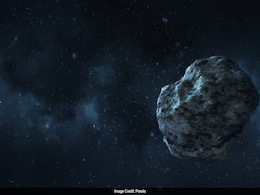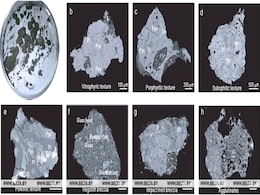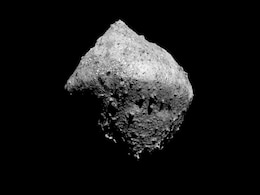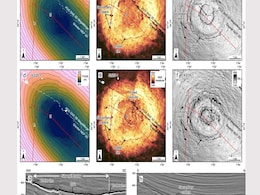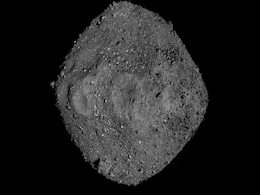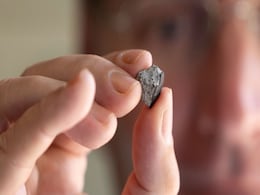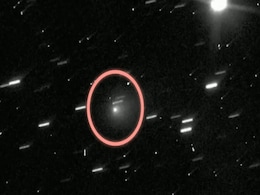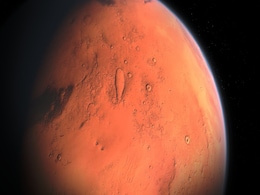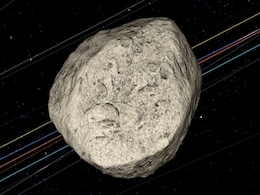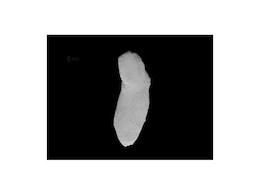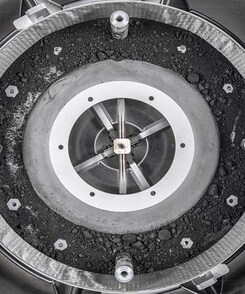Ancient Asteroid
- All
- News
- Web Stories
-

ESA Reveals City-Size ‘Cosmic Butterfly’ Crater on Mars Containing Signs of Ancient Water
- Wednesday December 17, 2025
- Written by Gadgets 360 Staff
ESA has captured a city-sized butterfly-shaped crater on Mars with smooth wings likely formed by melted underground ice. Studying this rare structure helps scientists understand asteroid impacts, Mars’ surface ice, and the planet’s ancient watery past while offering insight into how unusual crater formations develop on the Red Planet.
-
 www.gadgets360.com
www.gadgets360.com
-

NASA’s Perseverance Rover Finds Metal-Rich Rock on Mars: What You Need to Know
- Monday November 24, 2025
- Written by Gadgets 360 Staff
NASA’s Perseverance rover has identified Phippsaksla, a sculpted, metal-rich boulder in Jezero Crater with an unusually high iron-nickel composition. The rock’s chemistry strongly suggests it is a meteorite formed elsewhere in the solar system. Its presence within impact-shaped terrain offers fresh clues about ancient asteroids and helps scient...
-
 www.gadgets360.com
www.gadgets360.com
-

Scientists Discover Ancient Asteroid Crater Hidden Beneath the Atlantic Ocean
- Tuesday November 4, 2025
- Written by Gadgets 360 Staff
A recent study by researchers from Heriot-Watt University has confirmed the presence of a massive crater beneath the Atlantic. The evidence supports the findings and the impact that was caused by a 66-million-year-old asteroid.
-
 www.gadgets360.com
www.gadgets360.com
-

Scientists Find Rare Meteorites In China's Chang'e-6 Moon Samples
- Tuesday October 28, 2025
- Science | Edited by Astitva Raj
Chang'e 6 made history in 2024, by bringing back 1,935.3 grams of lunar samples from the Moon's South Pole-Aitken Basin.
-
 www.ndtv.com
www.ndtv.com
-

Chang’e-6 Lunar Samples Reveal Water-Rich Asteroid Fragments
- Saturday October 25, 2025
- Written by Gadgets 360 Staff
Analysis of Chang’e-6 lunar dust uncovered microscopic carbonaceous chondrite fragments—evidence of water-bearing asteroids that once struck the Moon. The discovery indicates a far greater delivery of water and organics to Earth and the Moon than thought, helping scientists refine theories about the solar system’s early volatile sources.
-
 www.gadgets360.com
www.gadgets360.com
-

Ryugu Samples Reveal Ancient Water Flow on Asteroid for a Billion Years
- Saturday October 18, 2025
- Written by Gadgets 360 Staff
Microscopic samples from asteroid Ryugu reveal that liquid water once flowed through its parent body long after its formation. The finding, led by University of Tokyo scientists, suggests that such asteroids may have delivered far more water to early Earth than previously thought, offering a new perspective on how our planet’s oceans originated.
-
 www.gadgets360.com
www.gadgets360.com
-

Scientists Confirm Ancient Asteroid Impact Created North Sea’s Silverpit Crater 43 Million Years Ago
- Tuesday September 23, 2025
- Written by Gadgets 360 Staff
New research confirms the Silverpit Crater in the North Sea was formed by an asteroid impact around 43 million years ago. Using seismic imaging and rare mineral evidence, scientists proved the impact origin beyond doubt, resolving a debate that lasted two decades and placing the crater among Earth’s rare, well-preserved impact structures.
-
 www.gadgets360.com
www.gadgets360.com
-

NASA’s OSIRIS-REx Mission Finds Stardust in Asteroid Bennu Older Than the Solar System
- Wednesday September 3, 2025
- Written by Gadgets 360 Staff
NASA’s OSIRIS-REx mission has found presolar stardust grains inside Bennu’s samples. These tiny particles, older than the Sun, carry chemical fingerprints of ancient stars and interstellar space. Bennu thus serves as a pristine time capsule, preserving the earliest clues to the birth of our solar system.
-
 www.gadgets360.com
www.gadgets360.com
-

Cosmic Visitor: 4.56-Billion-Year-Old Meteorite Strikes into Georgia Home
- Thursday August 14, 2025
- Written by Gadgets 360 Staff
On June 26, 2025, a dazzling daytime fireball streaked over Georgia, captured by satellites and witnessed across multiple states. A surviving fragment smashed through the roof of a McDonough home, denting the wooden floor 14 feet below. Scientists at the University of Georgia analyzed about 23 grams of this ancient rock, determining it to be a 4.56...
-
 www.gadgets360.com
www.gadgets360.com
-

Hubble Captures First Images of Ancient Interstellar Visitor Comet 3I/ATLAS
- Monday July 28, 2025
- Written by Gadgets 360 Staff
Hubble has captured images of comet 3I/ATLAS, an ancient interstellar object likely 7 billion years old. As only the third known visitor from beyond the solar system, it offers rare insights into distant planetary systems. With its water ice and D-type asteroid-like dust, 3I/ATLAS is now under global scientific scrutiny before it vanishes back into...
-
 www.gadgets360.com
www.gadgets360.com
-

3D Mapping Reveals 52-Foot Megaripples from Chicxulub Asteroid in Louisiana
- Thursday March 13, 2025
- Written by Gadgets 360 Staff
Massive megaripples, formed by the tsunami after the Chicxulub asteroid impact 66 million years ago, have been mapped deep beneath Louisiana using 3D seismic data. The formations, averaging 52 feet in height and spanning 900 square miles, offer new insights into the force of the ancient tsunami and its global impact. Scientists suggest these findin...
-
 www.gadgets360.com
www.gadgets360.com
-

Bennu Asteroid Sample Reveals Organic Compounds That May Hint at Life Beyond Earth
- Friday January 31, 2025
- Written by Gadgets 360 Staff
NASA’s OSIRIS-REx mission has delivered a sample from asteroid Bennu, revealing amino acids, nucleobases, ammonia, and minerals formed in saltwater. These organic compounds, vital to life, suggest that the building blocks for life might have existed in other regions of the early solar system. The discovery of evaporite minerals, including halite ...
-
 www.gadgets360.com
www.gadgets360.com
-

Seismic Data from NASA’s InSight Might Solve the Mystery of Mars’ Dichotomy
- Thursday January 23, 2025
- Written by Gadgets 360 Staff
NASA’s InSight mission has provided seismic data shedding light on the Martian dichotomy, the split between Mars’ northern lowlands and southern highlands. Findings from the mantle’s seismic wave analysis suggest the split stems from ancient tectonic activity and magma dynamics, rather than asteroid impacts. Variations in crust thickness and ...
-
 www.gadgets360.com
www.gadgets360.com
-

Apophis Asteroid Flyby in 2029: Earth's Gravitational May Impact Asteroid's Surface
- Thursday November 14, 2024
- Written by Gadgets 360 Staff
Asteroid 99942 Apophis, named after the ancient Egyptian god of darkness, is set to pass incredibly close to Earth in 2029, at just 32,000 km. While there is no risk of a collision, scientists are keen to study the asteroid’s interaction with Earth's gravity. Research led by planetary scientist Ronald Ballouz suggests that this flyby may cause si...
-
 www.gadgets360.com
www.gadgets360.com
-

Asteroid Apophis Could Experience Surface Changes Due to Earth’s Gravity During 2029 Flyby
- Wednesday November 6, 2024
- Written by Gadgets 360 Staff
The asteroid Apophis, named after the ancient Egyptian god of chaos, is set to pass extremely close to Earth in 2029, potentially causing seismic activity and landslides on its surface due to Earth's gravity. These changes could alter Apophis’ surface, providing a rare opportunity to observe asteroid dynamics in real-time. A team from Johns Hopki...
-
 www.gadgets360.com
www.gadgets360.com
-

ESA Reveals City-Size ‘Cosmic Butterfly’ Crater on Mars Containing Signs of Ancient Water
- Wednesday December 17, 2025
- Written by Gadgets 360 Staff
ESA has captured a city-sized butterfly-shaped crater on Mars with smooth wings likely formed by melted underground ice. Studying this rare structure helps scientists understand asteroid impacts, Mars’ surface ice, and the planet’s ancient watery past while offering insight into how unusual crater formations develop on the Red Planet.
-
 www.gadgets360.com
www.gadgets360.com
-

NASA’s Perseverance Rover Finds Metal-Rich Rock on Mars: What You Need to Know
- Monday November 24, 2025
- Written by Gadgets 360 Staff
NASA’s Perseverance rover has identified Phippsaksla, a sculpted, metal-rich boulder in Jezero Crater with an unusually high iron-nickel composition. The rock’s chemistry strongly suggests it is a meteorite formed elsewhere in the solar system. Its presence within impact-shaped terrain offers fresh clues about ancient asteroids and helps scient...
-
 www.gadgets360.com
www.gadgets360.com
-

Scientists Discover Ancient Asteroid Crater Hidden Beneath the Atlantic Ocean
- Tuesday November 4, 2025
- Written by Gadgets 360 Staff
A recent study by researchers from Heriot-Watt University has confirmed the presence of a massive crater beneath the Atlantic. The evidence supports the findings and the impact that was caused by a 66-million-year-old asteroid.
-
 www.gadgets360.com
www.gadgets360.com
-

Scientists Find Rare Meteorites In China's Chang'e-6 Moon Samples
- Tuesday October 28, 2025
- Science | Edited by Astitva Raj
Chang'e 6 made history in 2024, by bringing back 1,935.3 grams of lunar samples from the Moon's South Pole-Aitken Basin.
-
 www.ndtv.com
www.ndtv.com
-

Chang’e-6 Lunar Samples Reveal Water-Rich Asteroid Fragments
- Saturday October 25, 2025
- Written by Gadgets 360 Staff
Analysis of Chang’e-6 lunar dust uncovered microscopic carbonaceous chondrite fragments—evidence of water-bearing asteroids that once struck the Moon. The discovery indicates a far greater delivery of water and organics to Earth and the Moon than thought, helping scientists refine theories about the solar system’s early volatile sources.
-
 www.gadgets360.com
www.gadgets360.com
-

Ryugu Samples Reveal Ancient Water Flow on Asteroid for a Billion Years
- Saturday October 18, 2025
- Written by Gadgets 360 Staff
Microscopic samples from asteroid Ryugu reveal that liquid water once flowed through its parent body long after its formation. The finding, led by University of Tokyo scientists, suggests that such asteroids may have delivered far more water to early Earth than previously thought, offering a new perspective on how our planet’s oceans originated.
-
 www.gadgets360.com
www.gadgets360.com
-

Scientists Confirm Ancient Asteroid Impact Created North Sea’s Silverpit Crater 43 Million Years Ago
- Tuesday September 23, 2025
- Written by Gadgets 360 Staff
New research confirms the Silverpit Crater in the North Sea was formed by an asteroid impact around 43 million years ago. Using seismic imaging and rare mineral evidence, scientists proved the impact origin beyond doubt, resolving a debate that lasted two decades and placing the crater among Earth’s rare, well-preserved impact structures.
-
 www.gadgets360.com
www.gadgets360.com
-

NASA’s OSIRIS-REx Mission Finds Stardust in Asteroid Bennu Older Than the Solar System
- Wednesday September 3, 2025
- Written by Gadgets 360 Staff
NASA’s OSIRIS-REx mission has found presolar stardust grains inside Bennu’s samples. These tiny particles, older than the Sun, carry chemical fingerprints of ancient stars and interstellar space. Bennu thus serves as a pristine time capsule, preserving the earliest clues to the birth of our solar system.
-
 www.gadgets360.com
www.gadgets360.com
-

Cosmic Visitor: 4.56-Billion-Year-Old Meteorite Strikes into Georgia Home
- Thursday August 14, 2025
- Written by Gadgets 360 Staff
On June 26, 2025, a dazzling daytime fireball streaked over Georgia, captured by satellites and witnessed across multiple states. A surviving fragment smashed through the roof of a McDonough home, denting the wooden floor 14 feet below. Scientists at the University of Georgia analyzed about 23 grams of this ancient rock, determining it to be a 4.56...
-
 www.gadgets360.com
www.gadgets360.com
-

Hubble Captures First Images of Ancient Interstellar Visitor Comet 3I/ATLAS
- Monday July 28, 2025
- Written by Gadgets 360 Staff
Hubble has captured images of comet 3I/ATLAS, an ancient interstellar object likely 7 billion years old. As only the third known visitor from beyond the solar system, it offers rare insights into distant planetary systems. With its water ice and D-type asteroid-like dust, 3I/ATLAS is now under global scientific scrutiny before it vanishes back into...
-
 www.gadgets360.com
www.gadgets360.com
-

3D Mapping Reveals 52-Foot Megaripples from Chicxulub Asteroid in Louisiana
- Thursday March 13, 2025
- Written by Gadgets 360 Staff
Massive megaripples, formed by the tsunami after the Chicxulub asteroid impact 66 million years ago, have been mapped deep beneath Louisiana using 3D seismic data. The formations, averaging 52 feet in height and spanning 900 square miles, offer new insights into the force of the ancient tsunami and its global impact. Scientists suggest these findin...
-
 www.gadgets360.com
www.gadgets360.com
-

Bennu Asteroid Sample Reveals Organic Compounds That May Hint at Life Beyond Earth
- Friday January 31, 2025
- Written by Gadgets 360 Staff
NASA’s OSIRIS-REx mission has delivered a sample from asteroid Bennu, revealing amino acids, nucleobases, ammonia, and minerals formed in saltwater. These organic compounds, vital to life, suggest that the building blocks for life might have existed in other regions of the early solar system. The discovery of evaporite minerals, including halite ...
-
 www.gadgets360.com
www.gadgets360.com
-

Seismic Data from NASA’s InSight Might Solve the Mystery of Mars’ Dichotomy
- Thursday January 23, 2025
- Written by Gadgets 360 Staff
NASA’s InSight mission has provided seismic data shedding light on the Martian dichotomy, the split between Mars’ northern lowlands and southern highlands. Findings from the mantle’s seismic wave analysis suggest the split stems from ancient tectonic activity and magma dynamics, rather than asteroid impacts. Variations in crust thickness and ...
-
 www.gadgets360.com
www.gadgets360.com
-

Apophis Asteroid Flyby in 2029: Earth's Gravitational May Impact Asteroid's Surface
- Thursday November 14, 2024
- Written by Gadgets 360 Staff
Asteroid 99942 Apophis, named after the ancient Egyptian god of darkness, is set to pass incredibly close to Earth in 2029, at just 32,000 km. While there is no risk of a collision, scientists are keen to study the asteroid’s interaction with Earth's gravity. Research led by planetary scientist Ronald Ballouz suggests that this flyby may cause si...
-
 www.gadgets360.com
www.gadgets360.com
-

Asteroid Apophis Could Experience Surface Changes Due to Earth’s Gravity During 2029 Flyby
- Wednesday November 6, 2024
- Written by Gadgets 360 Staff
The asteroid Apophis, named after the ancient Egyptian god of chaos, is set to pass extremely close to Earth in 2029, potentially causing seismic activity and landslides on its surface due to Earth's gravity. These changes could alter Apophis’ surface, providing a rare opportunity to observe asteroid dynamics in real-time. A team from Johns Hopki...
-
 www.gadgets360.com
www.gadgets360.com




